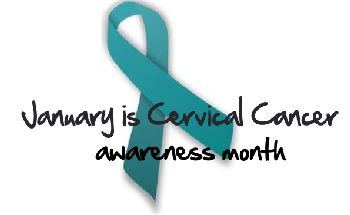 01/14/13 As Hoosiers begin making positive changes in 2013, State health officials encourage women to get regular screenings for cervical cancer as part of any New Year’s resolution to be healthier.
01/14/13 As Hoosiers begin making positive changes in 2013, State health officials encourage women to get regular screenings for cervical cancer as part of any New Year’s resolution to be healthier.
Each year, approximately 12,000 women in the United States get cervical cancer. From 2004 to 2008, 1,290 Hoosier women were diagnosed with cervical cancer and 425 women died of cervical cancer in Indiana.
January is Cervical Health Awareness Month and highlights the importance of women to get regular screenings, such as a Pap test.
“A Pap test can diagnose cervical cancer in its early, most treatable stages,” said State Health Commissioner Gregory Larkin, M.D. “It’s important to get this screening as the majority of cases of cervical cancers are beatable if found early.”
The American Cancer Society recommends that all women begin having regular Pap tests at age 21. Some women, because of their history, may need to have a different screening schedule for cervical cancer. It is important to talk to your doctor to see what is right for you in regard to screening.
The most important risk factor for cervical cancer is exposure to human papillomavirus (HPV). The virus is spread through sexual contact. Two high-risk HPV strains (HPV 16 and HPV 18) account for more than 70 percent of all cervical cancer cases, according to the National Cancer Institute.
Two vaccines, Gardasil and Cervarix, have been shown to protect against most cervical cancers in women. In addition, Gardasil has been shown to protect against other cancers and genital warts and is approved for use in males. The Centers for Disease Control and Prevention recommends vaccination for females and males ages 11 through 26.
According to the 2011 National Immunization Survey-Teen, it is estimated that 28 percent of adolescent girls in Indiana, ages 13 to 17, have received the complete series of the vaccine, which is administered in three doses.
“Getting the HPV vaccine is the most effective way to protect against cervical cancer,” said Dr. Larkin. “Cervical cancer is almost 100 percent preventable through regular routine screenings and vaccination.”
Another high risk factor for cervical cancer is smoking. Women who smoke are about twice as likely as non-smokers to get cervical cancer. To quit smoking or to help someone you care about quit, contact the Indiana Tobacco Quitline at 1-800-QUIT NOW (1-800-784-8669).
The Indiana Breast and Cervical Cancer Program provides access to breast and cervical cancer screenings, diagnostic testing, and treatment for underserved and underinsured women who qualify for services. To find out if you qualify for this program, call the Indiana Family Helpline at 1-855-HELP-1ST (1-855-435-7178).
For more information on cervical cancer, visit the Indiana State Department of Health website at www.StateHealth.in.gov.
For information on frequently asked questions regarding the HPV vaccine, visit http://www.cdc.gov/vaccinesafety/Vaccines/HPV/hpv_faqs.html














